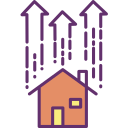Smart Home Innovations and Real Estate Value
The rapid development of smart home technologies is reshaping the real estate landscape, offering homeowners and buyers a new level of comfort, security, and efficiency. As homes become increasingly intelligent, their value and market appeal are rising, influencing both buyer preferences and property appraisals. This page explores the various facets of smart home innovations and demonstrates how they contribute to enhancing real estate value, making properties more desirable and future-ready in an evolving marketplace.

Internet of Things (IoT) Integration
The integration of the Internet of Things (IoT) in residential settings forms the backbone of modern smart homes. By connecting various devices—such as thermostats, lights, security cameras, and appliances—IoT enables seamless interoperability and centralized control. Homeowners benefit from personalized experiences, improved convenience, and energy efficiency. With the proliferation of IoT-enabled devices, homes are transforming into dynamically responsive environments that adapt to occupant needs and preferences, setting a new benchmark for residential living.

AI-Driven Home Automation
Artificial Intelligence (AI) has become a critical driver in advancing smart home solutions. AI-powered systems learn user habits, routines, and preferences over time, enabling homes to anticipate occupant needs and optimize daily operations. Automation extends to climate control, lighting, security, and even entertainment, enhancing both comfort and efficiency. As AI becomes more sophisticated, its integration into residential properties not only delivers convenience but also contributes significantly to higher perceived and appraised property values.

Smart Home Ecosystem Compatibility
As multiple brands and manufacturers develop smart home devices, consistency and compatibility are paramount for a seamless user experience. Ecosystem compatibility ensures that all smart devices—regardless of brand—work harmoniously together, controlled through centralized apps or voice assistants. This interoperability not only simplifies home management but also future-proofs properties, assuring buyers that new technologies can be easily integrated without the need for major upgrades or replacements.
Video Surveillance and Remote Monitoring
Modern video surveillance systems have evolved from traditional closed-circuit setups to intelligent, internet-connected solutions offering real-time remote access. Owners can monitor their properties via smartphones or computers, receive instant alerts about unusual activity, and review high-definition footage stored in the cloud. This level of accessibility not only deters potential intruders but also provides reassurance to homeowners and prospective buyers, further enhancing the perceived safety and value of a property.
Smart Locks and Access Control
Smart locks represent a major leap forward in home access and security. Homeowners can grant or revoke access remotely, set temporary digital keys for guests, and track entries and exits through integrated apps. The convenience of keyless entry, combined with robust encryption and tamper alerts, appeals strongly to modern buyers who prioritize both security and innovative features. The presence of such systems adds tangible value during property appraisals and real estate negotiations.
Integrated Alarm Systems
The integration of alarms with smart sensors elevates the protection of residential properties. Fire, carbon monoxide, and intrusion alarms now communicate directly with homeowners and emergency services. Automated triggers, such as coordinated lighting and instant alert notifications, significantly improve incident response times. Homes equipped with integrated, smart alarm systems stand out in the market, positioning themselves as safer investments with reduced risk and associated insurance benefits.

Energy Efficiency and Sustainability
Smart thermostats revolutionize home climate control by learning residents’ schedules and adjusting temperatures automatically for maximum comfort and efficiency. Some models even respond to weather forecasts and occupancy patterns, minimizing energy waste. These energy-saving capabilities lower monthly expenses and appeal to eco-conscious buyers. As more consumers seek out homes that are both comfortable and cost-effective, the integration of smart climate solutions proves to be a valuable asset for sellers.
Smart Homes and Appraised Value
Properties equipped with advanced smart technologies stand out during comparative market analyses (CMA). Appraisers can quantify the added value by comparing similar homes with and without smart features, leading to more accurate pricing. These enhancements are often highlighted in listings and appraisals, helping sellers justify higher asking prices. As smart technologies become standard expectations, their absence can actually diminish a property’s comparative appeal.
Previous
Next
Buyer Preferences in a Connected World
Appeals to Tech-Savvy Buyers
A growing segment of the housing market consists of tech-savvy individuals who expect homes to support their digital lifestyles. Features such as voice control, integrated entertainment systems, and robust Wi-Fi connectivity are more than conveniences—they are necessities. Properties that meet or exceed these expectations not only attract a broader pool of potential buyers but also command higher prices, reflecting the tangible benefits of a tech-focused approach to home ownership.
Family-Oriented Smart Solutions
Families are embracing smart home innovations for the safety, convenience, and peace of mind they offer. Parental controls, video doorbells, and real-time activity alerts help parents monitor their loved ones and manage daily routines more effectively. The ability to automate chores and remotely oversee household functions simplifies busy schedules, making smart homes particularly appealing to families seeking both comfort and security in their next residence.
Age-in-Place Technology for Seniors
Smart homes can empower seniors to live independently for longer periods through accessible technologies such as voice-activated assistants, fall detection sensors, and automated lighting. These features make daily life safer and more manageable for older occupants while providing reassurance to their families. As the demand for age-in-place solutions increases, properties outfitted with such systems become highly attractive in the real estate market, increasing their value and appeal to a broader demographic.
Previous slide
Next slide
Challenges and Considerations for Homeowners
Cost of Installation and Upgrades
Initial investment in smart home technologies can be significant, especially for comprehensive systems that require rewiring or structural adjustments. Homeowners should assess the long-term savings and potential value increase against upfront costs. Many find that the eventual energy savings, improved security, and enhanced resale prospects outweigh the initial expenditure, but informed decision-making is crucial to maximize return on investment.
Data Security and Privacy
Connected devices collect and transmit sensitive data, making cybersecurity a major concern for smart homeowners. It’s essential to choose reputable brands, implement strong passwords, and keep software updated to minimize risks. Awareness of data handling practices and compliance with privacy regulations can protect residents from breaches. As data privacy becomes a top buyer concern, robust cybersecurity measures are increasingly factoring into property value assessments.
Future-Proofing the Smart Home
With rapid technological changes, today’s smart home features may soon become outdated. Homeowners should prioritize scalable and upgradable systems that support new protocols and integrate easily with future innovations. Consulting with experts and opting for products known for backward compatibility helps maintain a property’s value and appeal over time, preventing obsolescence and supporting sustained real estate appreciation.
